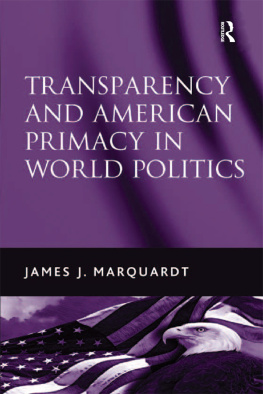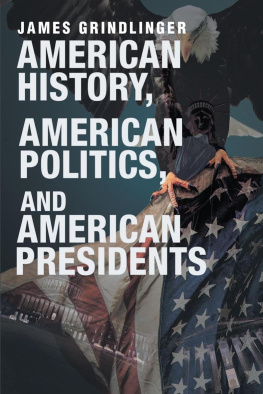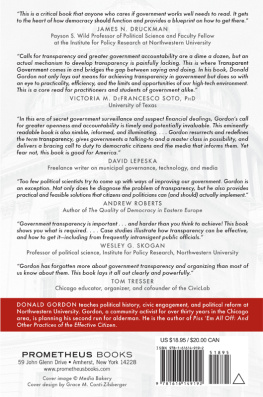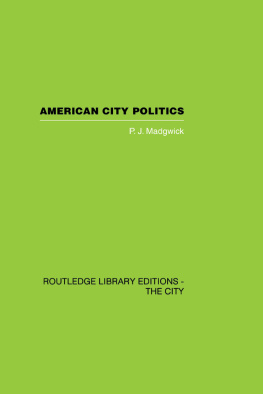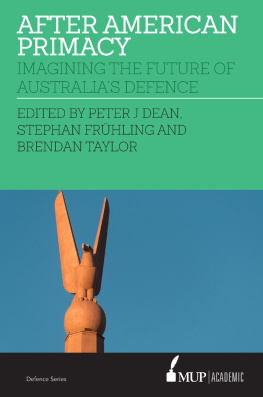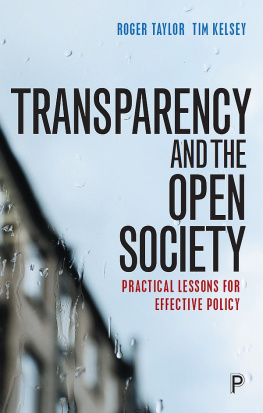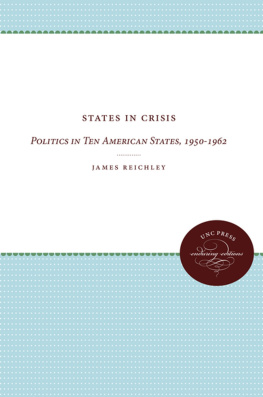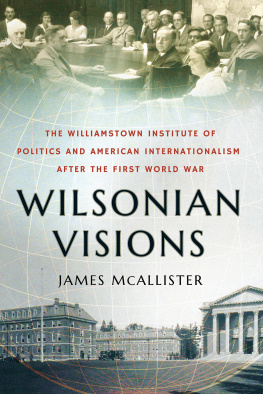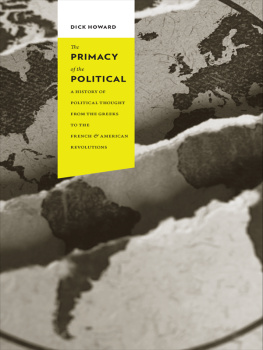TRANSPARENCY AND AMERICAN PRIMACY IN WORLD POLITICS
For my parents
Transparency and American Primacy in World Politics
JAMES J. MARQUARDT
Lake Forest College, USA
First published 2011 by Ashgate Publishing
Published 2016 by Routledge
2 Park Square, Milton Park, Abingdon, Oxon OX14 4RN
711 Third Avenue, New York, NY 10017, USA
Routledge is an imprint of the Taylor & Francis Group, an informa business
Copyright James J. Marquardt 2011
James J. Marquardt has asserted his right under the Copyright, Designs and Patents Act, 1988, to be identified as the author of this work.
All rights reserved. No part of this book may be reprinted or reproduced or utilised in any form or by any electronic, mechanical, or other means, now known or hereafter invented, including photocopying and recording, or in any information storage or retrieval system, without permission in writing from the publishers.
Notices:
Product or corporate names may be trademarks or registered trademarks, and are used only for identification and explanation without intent to infringe.
British Library Cataloguing in Publication Data
Marquardt, James J.
Transparency and American primacy in world politics. 1. United StatesForeign relations. 2. Balance of power. 3. World politics20th century. 4. World politics21st century. 5. Transparency in government. 6. Confidence and security building measures (International relations) 7. National security. 8. Economic policy. 9. Government information.
I. Title
327.73dc22
Library of Congress Cataloging-in-Publication Data
Marquardt, James J.
Transparency and American primacy in world politics / by James J. Marquardt.
p. cm.
Includes bibliographical references and index.
ISBN 978-0-7546-7186-2 (hardback : alk. paper)
1. Transparency in governmentUnited States. 2. United StatesForeign relations20th century. 3. United StatesForeign relations21st century. I. Title.
JK468.S4M345 2010
327.73dc22
2010035183
ISBN 9780754671862 (hbk)
Contents
The year 2010 will go into the record books as one of the most contested and nasty in American national politics in recent memory. After a protracted debate and a series of desperate and obscure parliamentary maneuvers by the Democratic Partys legislative leadership, in March Congress passed and the president signed into law the most sweeping reform of the American health care system in nearly half a century. The political wrangling over the new law hardened political battle lines as Democrats and Republicans headed into the fall mid-term elections. Concerned that the Democrats might lose many more seats in both chambers of Congress than is normally the case for the party in power, the Democrat-controlled Senate took up a bill in July (passed earlier in the year by the Democrat-controlled House of Representatives) that would have required political action committees airing campaign advertisements to identify their major funders. This piece of legislation came in response to a controversial 5 to 4 decision of the US Supreme Court in Citizens United v. Federal Election Commission that struck down a provision of the McCain Feingold Act of 2001 prohibiting corporations and unions from funding political ads in the run-up to national elections.
The endless struggle for power between the two parties is at the heart of the political debate on transparency of campaign financing. Since corporations spend much more money on political ads than unions, and since they are more closely aligned politically with Republicans than Democrats, the Senate Democrats proposed legislation - the Democracy is Strengthened by Casting Light on Spending in Elections or DISCLOSE Act - has clear political motives. The Democrats wanted a floor debate on the proposed legislation so as to draw public attention to the close ties between corporations and the Republican Party. Certain that Senate Republicans would oppose it, they also wanted a debate on the disclosure bill so that they might use transparency of campaign financing as a wedge issue in the fall elections by identifying the Republicans as interested in protecting special interests at the expense of cleaning-up elections.
Like their Democratic counterparts, Senate Republicans used their opposition to the bill for their own benefit. They successfully filibustered the bill on the grounds that it placed Republicans in a no-win situation. If Republicans let the bill come to the floor and voted against it, the bill would have probably passed anyway, and they would have gone on record as opposing campaign finance reform. If they had instead voted for the bill, then the advantage they have accrued over the years from independent campaign ads would have been put at risk in the event corporations balked at having their names associated with conservative causes. Cleverly, Republicans also claimed the disclosure rules in the Democrats bill did not go nearly far enough in exposing the true extent to which the many hundreds of millions of dollars spent in each election cycle (by corporations and unions) is corrupting American national politics. In effect, they portrayed themselves as the true champions of greater transparency of campaign financing.
The bottom line is this: These long-time political rivals have failed to cooperate because neither side can separate its political interests - measured in terms of expected gains and losses in the mid-term elections - from its transparency declarations on the reform of the campaign finance system. It should come as no surprise that the real casualty of this zero-sum, political power struggle is the much-needed reform both sides claim they want.
You may be wondering what this story has to do with transparency and American foreign policy. First, the prevalence of transparency in the domestic politics of the United States underscores transparencys place as a core value of American political life. Given the importance many attach to the advancement of American values abroad, greater transparency among the countries of the world (and involving other international actors) is a top priority of American foreign policy. Indeed, since the time of Woodrow Wilson the US has advocated openness and publicity (as it was called back then) in international relations. As it is with its support for other core values like democracy and human rights, however, Americas support for greater transparency cannot be separated from its national interests defined in terms of power.
Second, just as the two dominant political parties in the United States approach transparency in the political life of the country in relation to the struggle between them for political power (and especially in situations of divided government, when one party controls the White House and the other controls Congress), the United States does something quite similar in its relationships with its rivals on the world stage. The struggle for power between the US and others has no hard-and-fast laws and well-established institutional mechanisms and norms to guide it. Consequently, in an anarchic international system, the politics of transparency, in military-security affairs especially, is a gambit in which pro-transparency rhetoric clashes with and succumbs to the harsh reality of the competition for security.
The United States has long championed greater transparency among the countries of the world, but it has traditionally sought to place the burden of advancing this goal on its rivals. In so doing, the US is in search of gains in the form of transparency arrangements that oblige its rivals to disclose more about their military-security matters than they are inclined to do otherwise. The US also maintains that it is an open society and that, as such, its rivals already know a lot more about the US than the US does about them. Therefore, the argument goes, these arrangements are necessary to bring greater balance to the flow of information between them. The resistance of Americas rivals to many of its transparency initiatives has the effect of further complicating relations between them. Paradoxically, what is promoted as a partial solution to reducing tensions has negative effects - the US interprets the resistance of others as indicative of their secrecy and aggressive aims, and Americas rivals see in its transparency initiatives an effort to entrap them in an unequal power relationship in which they are under the watchful eye of their more powerful potential adversary. Like Democrats and Republicans battling it out on Capitol Hill, the US and its rivals recognize that there is mutual benefit to greater transparency, but they are unable to separate their support for transparency from their core interest of enhancing their power at the others expense.


